Lord Cecil's Crusade
All the Way. By Viscount Cecil. (Hodder and Stoughton. 21s.)
WHEN Lord Cecil published his book The Great Experiment (an examination of the League of Nations) one reviewer urged him to write his autobiography, and received the answer that that would never happen, as he had kept no diary and possessed no memory. These obstacles, fortunately, have been circumvented, and the result is this singularly interesting record of a life which began in 1864 and will, it is to be hoped, last for many years yet. That the book should deal largely with international affairs is inevitable. Dr. Devlin's remark that " the noble Lord has one leg in the Middle Ages and one in the League of Nations " is well known. It is, like most epigrams, only half true. Lord Cecil in his youth was a Con- servative by tradition and by instinct ; he regarded the substitution of the moneyed interest for the landed interest in politics in his lifetime as by no means a change for the better ; but he was never reactionary or troglodytic. And he swung steadily Leftward ; in 1945, he admits, he would have cast his vote for Labour if he had had a vote to cast (which, as a peer, he had not). The truth is that the observation he makes about Lord Carnarvon " Though he undoubtedly acted from the highest motives, his temperament was
inconsistent with the working of the party system," applies in con- siderable measure to himself. Not entirely, for he tells with what hesitations but what persistency he kept his seat among the Con- servatives in the House of Commons when he thought them wrong on a number of issues. But he resigned office over the Welsh Church Bill in 1919 and again over the naval negotiations with the United States in 1927 ; he had offered resignation in 1926 in the con- troversies over the admission of Germany to the League, and he describes himself as " frequently on the verge of resignation" in desperation at the indifference of the Baldwin Government to the League in the middle twenties.
But all this came relatively late in life. What is furthest and least familiar in these pages is the account of Lord Robert's now distant youth—Hatfiel4 in the seventies, Eton a little later, Oxford and early days at the Bar a little later still. Dizzy was a frequent visitor at Hatfield, and he is remembered as " repulsively ugly, very pale, with perhaps naturally black hair." Eton Lord Cecil, not much of a school athlete, though he played (real) tennis for Oxford, did not like. He has an attractive description of his efforts to construct Latin verses, and of his mastery of Greek plays he writes : " I remember one Eton master praising that part of my work, which shows that the standard must have been low." Going on assize as marshal to various judges he had plenty of interesting cases to observe. On one of them, concerning a nervous householder who, hearing a suspicious noise about four in the morning, shot, with fatal effects, something which proved to be his cook, produces the comment: " It only shows how rash it is for cooks to get up very early. Few of them would 'do it now." So on into the quagmire of politics (after proposing successfully in 1888 to Lady Eleanor Lambton- " certainly the cleverest thing I have ever done "). Lord Cecil was elected for East Marylebone as a Free Trade Conservative in the 1906 election and held a seat in the House of Commons (with one year's interval) till he went to the House of Lords in 1923. He fought Birrell's Education Bill, hating Cowper-Templeism, which he regards as one of the causes of the emptiness of the churches today. He fought the Disestablishment of the Cinirch in Wales ; he fought Home Rule ; and he fought the attack on the powers of the House of Lords.
In his chapters on the League and international affairs generally Lord Cecil necessarily covers much ground already covered in his Great Experiment, but he reveals much more clearly here than in that volume the difficulties under which he had to work when a Minister nominally in charge of League affairs. Lord Curzon flatly refused him a room in the Foreign Office and Sir Austen Chamberlain repeated the refusal later. Not till 1929 was he installed there, in an almost purely' personal capacity, by Arthur Henderson. On these and other contemporaries Lord Cecil's comments are instructive. With Grey he had everything in common, with Asquith very much, though he admitted that the latter fell short when decisive action was called for. He speaks with severity of Ramsay MacDonald's vanity and inaccessibility when in office, and has nothing but con- demnation for Baldwin's good-tempered apathy regarding all the causes Lord Cecil cared for most. He thinks that Lord Riddell's statement that Lloyd George hated the League is an exaggeration, though with a good deal to justify it. His case against all the Governments from 1919 to 1939 is that when two courses were open to them—to build up the League and rely for security on that, or to build up British armaments and rely on them—they did neither, and in due course paid the penalty. That thesis is closely and, on the whole, convincingly reasoned.
All the if7rry has its defects. It is not well arranged, and there are slips of memory and occasionally of spelling (e.g., Macdonald for MacDonald throughout), but it is the book that thousands of Lord Cecil's friends in all countries wanted. Important for its wide and considered survey of 'public affairs over more than half a century, it is instinct with a warm and mellow humanity which for many
will constitute its highest value. WILSON HARRIS.






































 Previous page
Previous page